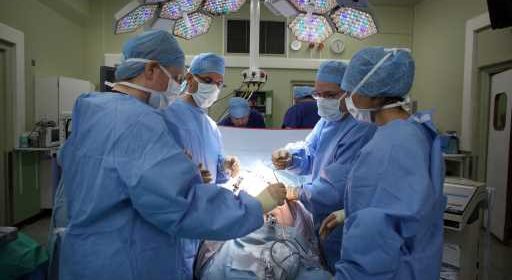Two hospital chains will restart surgeries in the Denver area April 27 as coronavirus restrictions relax

At least two hospital chains will restart surgeries in the Denver area Monday, but that doesn’t mean everyone whose care was put off is going to be scheduled right away.
Gov. Jared Polis issued an executive order banning non-emergency procedures at most Colorado hospitals on March 19. He announced Monday that health care providers could begin offering those services again in a week, as part of an effort to gradually reopen businesses.
The Centers for Medicare and Medicaid Services recently issued guidelines that hospitals could begin offering elective services if they have adequate staffing and enough protective equipment, and if they can separate patients who have COVID-19 from those who don’t.
Nikki Sloup, spokeswoman for SCL Health, said they are planning to restart at “needed” surgeries on Monday. SCL owns Saint Joseph Hospital and Lutheran, Platte Valley and Good Samaritan medical centers.
The hospitals, physicians and patients will work together to determine who needs surgery almost immediately and who can wait, so that enough staffing and protective equipment are available, Sloup said.
“As we move forward with these plans, our top priority remains ensuring a safe environment of care for our patients, physicians, caregivers and associates,” she said.
Dr. Stephen Cobb, chief medical officer for Centura Health’s Denver metro locations, said they also will restart elective procedures on Monday. Centura owns five Adventists hospitals along the Front Range, St. Anthony Hospital and OrthoColorado, which specializes in joint and spine surgeries.
Doctors at each hospital are deciding which surgeries to do based on how urgent it is for the patient, how much protective equipment it will consume and the odds that the patient would need to stay in the intensive care unit, Cobb said. Screening is in place and patients who have COVID-19 are in isolated wards, so people who don’t have the virus can seek care safely, he said.
“We will daily evaluate what is happening with the pandemic and adjust as needed,” he said.
Denver Health is still evaluating when to start offering elective services again, spokeswoman April Valdez Villa said. UC Health said it could begin offering those services next week, but it’s still evaluating the situation.
Kaiser Permanente, which owns clinics that offer outpatient elective procedures, also didn’t commit to a specific date to resume those services. A statement said those decisions would depend on staffing, stocks of personal protective equipment and what they could offer while still keeping patients at least 6 feet from others.
Representatives from both SCL and Centura raised concerns that people were avoiding necessary medical care, because of fear they would pick up COVID-19 in a hospital. There are anecdotal reports of people delaying calling an ambulance for a possible heart attack or stroke, or deciding to give birth at home, because of fear of contagion. It’s not clear if those anecdotes are outliers or signs of a real trend, though.
Intensive care beds need to be available before offering elective services because patients might develop complications, said Glen Mays, chair of the department of health systems, management and policy at the Colorado School of Public Health. Shortages of protective equipment could also cause delays in offering additional services, he said.
“If you’re stretching and reusing equipment (intended for only one use), you’re not back to normal,” he said.
Hospitals will also have to carefully weigh the available resources against the severity of the patient’s condition, Mays said. For example, treatment for cancer or a cardiac surgery might not be an emergency, but delaying it too long could put the patient’s health or life at risk, he said.
Chris Tholen, president and CEO of the Colorado Hospital Association, said facilities will need to assess their resources locally, and also monitor for signs of a resurgence in cases as social distancing rules are relaxed.
Some small rural hospitals were exempt from the ban on elective procedures, which account for most of their revenue. Still, patients are more likely to be comfortable seeking care after the order is relaxed, and doctors who live in Denver and work a few days a month in rural areas will be more willing to travel, said Kevin Stansbury, CEO of Lincoln Community Hospital in Hugo.
“We definitely expect this to change patient decision-making,” he said.
Dave Engel, CEO of Southeast Colorado Hospital District in Springfield, said the hospital had canceled its monthly surgery day in April, but will have one again in May. It’s not unusual for rural areas to only offer surgeries at limited times, when specialists who live elsewhere visit.
Engel estimated all elective procedures, surgical and otherwise, are down about 50% compared to April 2019. Some people are still “apprehensive” about seeking care, but the hospital is taking steps to prevent the virus from spreading like taking patients’ temperatures on the way in, using virtual visits when possible and spacing out appointments so people aren’t waiting together, he said.
“We’re going to take our time,” he said. “We don’t want to cause anyone to acquire an illness just because an order has been lifted.”
Subscribe to bi-weekly newsletter to get health news sent straight to your inbox.
Source: Read Full Article